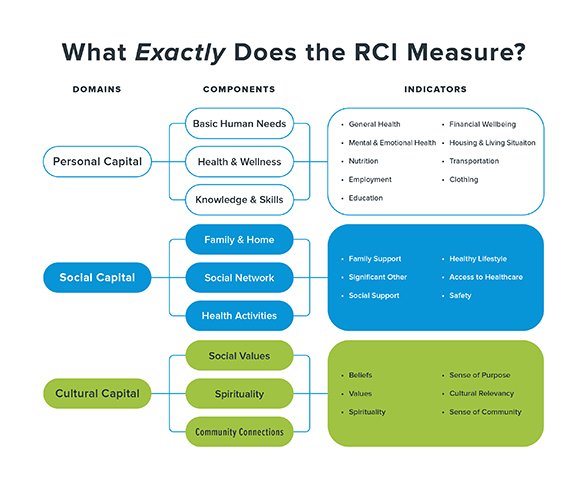Sobriety or use does not affect the score, nor does treatment modality, recovery, or wellness pathway. As a validated, holistic, and person-centered metric, the Recovery Capital Index measures the internal and external assets individuals utilize to initiate and sustain recovery.
The Why Behind the RCI
The Recovery Capital Index (RCI) measures what it says it measures: addiction wellness. Developed at Face it TOGETHER (FIT) by David Whitesock (now CEO & Founder of Commonly Well), the RCI is built on three domains, nine indicators, and 22 components which have been proven to positively affect recovery and provide a comprehensive assessment of intervention effectiveness.
It also focuses on longitudinal health outcomes, giving therapists and peer coaches insights into an individual’s progress, growth, and well-being over time.
How do you measure recovery?
This was the question asked to David in 2012. His initial reply was, “I’ve been sober 9,157 days. Isn’t that how you measure recovery?” His boss simply replied, “I think there’s something more.”
What the research revealed is that the quality of a person’s life is determined by a multitude of factors. It is the combination of these factors that directly influences an individual’s ability to sustain recovery.
So, the RCI measures each of those factors and aggregates the factorial scoring.
What exactly does the RCI measure?
What is significant about the RCI is how it measures a person’s lived experience in relation to their addiction and not their addiction in relation to their lived experience. This is an important distinction because it reveals the need to understand the assumptions or biases in all such assessments.
The RCI is segmented into three domains, nine components, and 22 indicators, as shown in the visual. It is built upon the theory of recovery capital first described by William Cloud and Robert Granfield, and is modeled on the Social Progress Index (SPI)
The SPI is a validated framework at a much larger population scale, rather than recovery capital’s focus on individual well-being. Additionally, like the SPI, the RCI was designed to measure outcomes, not identify inputs.
What makes the RCI a valid measure?
-
Biostatisticians psychometrically analyzed the 68-item assessment
-
Initial dataset was a statistically representative cohort of 154 individuals with RCI scores over time
-
All items were reviewed to meet basic criteria for sufficient variability, meaning each item could discriminate sensitively between individuals on the underlying assessment construct
-
Intercapital correlations were conducted to test the construct validity of whether a total score could be representative of three domains (person, social, cultural capital)
-
The Cronbach’s of the nine components was 0.88, suggesting a relatively high internal consistency
-
Spearman correlation matrix of the components showed a p value of less than 0.05, which indicates that any two of the variables were measuring slightly different aspects of across all three domains
-
Inter-factor correlations of the three domains were conducted and showed a moderate positive relationship with correlation coefficient around 0.5, verifying that the three domains measure different aspects of the total RCI score
-
Cronbach-alpha was found acceptable for the 68-item RCI (later applied to determine selection of 36- and 10-item versions of the RCI.
This study confirmed that the RCI measures what it is supposed to measure and accurately describes the current state of recovery for the individual taking the assessment.
To uncover meaningful recovery intelligence, you have to capture meaningful data. Learn more about how Commonly Well provides patient-reported data, behavioral insights, and predicted outcomes for addiction treatment on our blog.
Commonly Well uses a text messaging platform to design custom automated and
personalized engagement strategies for data capture, performance monitoring, and
outcomes measurement.
Got questions or want to learn more about our Recovery Intelligence Model?
Text: OUTCOMES to 833.280.3781
Call: 917.672.6665
Email: hello@commonlywell.com
Post Categories
Next Article →

